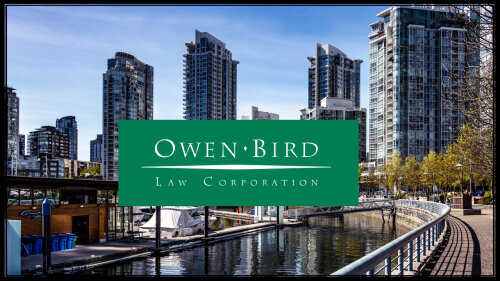Best Bad Faith Insurance Lawyers in Vancouver
Share your needs with us, get contacted by law firms.
Free. Takes 2 min.
List of the best lawyers in Vancouver, Canada
About Bad Faith Insurance Law in Vancouver, Canada
Bad Faith Insurance Law in Canada refers to the scenarios where an insurance company fails to handle its insured client's claim in an honest, fair, and respectful manner. The concept of bad faith is not explicit in Canada's insurance law; however, obligations of good faith are recognized by the courts and various regulations. In Vancouver, these allegations often are related to unreasonable claim denial, delay in claim processing, inadequately investigating a claim, and failing to properly defend a client in litigation. If an insurer is found acting in bad faith, they could be liable for damages beyond the policy limits.
Why You May Need a Lawyer
If you believe your insurance company is not dealing with your claim fairly or needs a prolonged period to process your claim without reasonable cause, you may require a lawyer. Legal help may further be needed if your insurer is not communicating with you about your claim, providing ambiguous policy language to avoid claim processing, or tries to settle your claim for less than fair value. Navigating bad faith insurance claims can be complicated and having a professional legal advice can help you understand your rights and potential remedies.
Local Laws Overview
The legal framework for bad faith insurance in Vancouver is shaped by Canadian common law and specific regulations such as the Insurance Act of British Columbia. The Act imposes certain obligations on insurers, like acting in "utmost good faith" and dealing with claims promptly and fairly. Breach of these duties may constitute bad faith. The courts also consider actions that prove the violation of the 'duty of fair representation' and conduct demonstrating 'bad faith.' Insurers found guilty of such actions can face penalties, including obligation to pay punitive damages.
Frequently Asked Questions
What constitutes a bad faith action by an insurance company?
Bad faith actions can include wrongly denying a claim, delays in handling the claim, improper investigations, using intimidating tactics or failing to defend a policyholder in litigation.
What are my rights if faced with bad faith insurance?
Policyholders are entitled to fair dealings, prompt claims handling, and comprehensive communication with their insurer. If these are violated, claimants have the right to seek legal remedies, which can include contract damages, mental distress damages, and in some cases, punitive damages.
What can I do if I believe my insurer is acting in bad faith?
If you suspect bad faith actions, it's recommended to consult with a lawyer specializing in insurance law. They can guide you on how to proceed, which may involve negotiating with the insurer, filing a lawsuit or lodging a complaint with regulatory bodies.
How long do I have to dispute a claim in Vancouver?
You generally have two years from the date of loss or denial of your claim to file a lawsuit against the insurance company in British Columbia.
Can I recover more than my policy limits for a bad faith claim?
Yes. If an insurer is found guilty of acting in bad faith, you may be entitled to damages beyond your policy limit, which can include legal costs and punitive damages.
Additional Resources
The Insurance Bureau of Canada (IBC) provides information about insurance policies and rights of the policyholders. Furthermore, the British Columbia Law Institute and the Canadian Legal Information Institute (CanLII) have multiple resources regarding bad faith insurance law in Canada. Local law libraries and legal advice clinics can also provide valuable guidance.
Next Steps
If you need legal assistance for a suspected bad faith insurance case, consider consulting a lawyer specializing in insurance law. Collect all relevant documents, including your insurance policy, correspondences with your insurer, and evidence related to your claim. Prepare a timeline of events and be ready to explain your situation in detail. This will assist your lawyer in understanding your case and provide you with proper guidance.
Lawzana helps you find the best lawyers and law firms in Vancouver through a curated and pre-screened list of qualified legal professionals. Our platform offers rankings and detailed profiles of attorneys and law firms, allowing you to compare based on practice areas, including Bad Faith Insurance, experience, and client feedback.
Each profile includes a description of the firm's areas of practice, client reviews, team members and partners, year of establishment, spoken languages, office locations, contact information, social media presence, and any published articles or resources. Most firms on our platform speak English and are experienced in both local and international legal matters.
Get a quote from top-rated law firms in Vancouver, Canada — quickly, securely, and without unnecessary hassle.
Disclaimer:
The information provided on this page is for general informational purposes only and does not constitute legal advice. While we strive to ensure the accuracy and relevance of the content, legal information may change over time, and interpretations of the law can vary. You should always consult with a qualified legal professional for advice specific to your situation.
We disclaim all liability for actions taken or not taken based on the content of this page. If you believe any information is incorrect or outdated, please contact us, and we will review and update it where appropriate.









